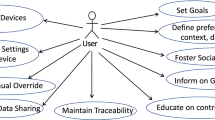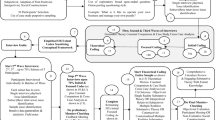Abstract
Grounded Theory is a research method that generates theory from data and is useful for understanding how people resolve problems that are of concern to them. Although the method looks deceptively simple in concept, implementing Grounded Theory research can often be confusing in practice. Furthermore, despite many papers in the social science disciplines and nursing describing the use of Grounded Theory, there are very few examples and relevant guides for the software engineering researcher. This paper describes our experience using classical (i.e., Glaserian) Grounded Theory in a software engineering context and attempts to interpret the canons of classical Grounded Theory in a manner that is relevant to software engineers. We provide model to help the software engineering researchers interpret the often fuzzy definitions found in Grounded Theory texts and share our experience and lessons learned during our research. We summarize these lessons learned in a set of fifteen guidelines.







Similar content being viewed by others
Notes
Any researcher with a toddler at home may not find this method practical.
References
Adolph S, Hall W, Kruchten P (2008) A methodological leg to stand on: lessons learned using grounded theory to study software development. Paper presented at the Proceedings of the 2008 conference of the center for advanced studies on collaborative research: meeting of minds.
Annells M (1996) Grounded Theory Method: Philosophical Perspectives, Paradigm of Inquiry, and Postmodernism. Qual Health Res 6(3):379–393
Bartels A, Holmes BJ, Lo H (2006) US Slowdown In 2007 Will Dampen The $1.6 Trillion Global IT Market. Forrester Research. Retrieved from http://www.forrester.com/Research/Document/Excerpt/0,7211,40451,00.html
Benoliel JQ (1996) Grounded Theory and Nursing Knowledge. Qual Health Res 6(3):406–428
Boehm, B. W. (1984). Software Engineering Economics. IEEE Trans Softw Eng 10(1)
Boehm BW, Clark B, Horowitz E, Westland C, Madachy R, Selby RW (1995) Cost models for future software life cycle processes: COCOMO 2.0. Ann Softw Eng 1(1)
Booch G, Rumbaugh J, Jacobson I (1998) The Unified Modeling Language User Guide. Addison-Wesley
Charmaz K (2006) Constructing Grounded Theory: A Practical Guide Through Qualitative Analysis. Thousand Oaks, Sage
Cockburn A (2002) Agile Software Development Joins the "Would-Be" Crowd. Cutter IT J 15(1)
Cockburn A (2003) People and Methodologies in Software Development. University of Oslo, Oslo
Cockburn A, Highsmith J (2001) Agile software development, the people factor. Computer 34(11):131–133
Coleman G, Conner O (2007) Using Grounded Theory to Understand Software Process Improvement: A Study of Irish Software Product Companies. Inf Softw Technol 49(6)
Corbin J, Strauss A (1990) Grounded Theory Research: Procedures, Canons, and Evaluative Criteria. Qual Sociol 13(1):19
Curtis W, Krasner H, Shen V, Iscoe N (1987) On building software process models under the lamppost. Paper presented at the Proceedings of the 9th international conference on Software Engineering
Dey I (1999) Grounding Grounded Theory: Guidelines for Qualitative Inquiry. Academic Press
Diaz M, Sligo J (1997) How software process improvement helped Motorola. Softw IEEE 14(5):75–81
Dittrich Y, John M, Singer J, Tessem B (2007) For the Special Issue on Qualitative Software Engineering Research. Inf Softw Technol 49(6):531–539
Dyba T, Moe NB, Arisholm E (2005) Measuring software methodology usage: challenges of conceptualization and operationalization.
Emerson R, Fretz R, Shaw L (1995) Writing Ethnographic Fieldnotes. University of Chicago Press, Chicago
Fitzgerald B (1998) An empirical investigation into the adoption of systems development methodologies. Inf Manage 34(6):317–328
Gasson S (2003) Rigor In Grounded Theory Research: An Interpretive Perspective On Generating Theory From Qualitative Field Studies. In M. Whitman & A. Woszczynski (Eds.), Handbook for Information Systems Research Hershey PA: Idea Group Publishing
Glaser BG (1965) The Constant Comparative Method of Qualitative Analysis. Soc Probl 12(4):436–445
Glaser BG (1978) Theoretical Sensitivity. Sociology Press, Mill Valley, California
Glaser, BG (1992) Emergence vs Forcing: Basics of Grounded Theory Analysis. Sociology Press, Mill Valley, California
Glaser BG (1998) Doing Grounded Theory: Issues and Discussions. Sociology Press, Mill Valley, California
Glaser B (2001) The Grounded Theory Perspective: Conceptualization Contrasted with Description. Sociology Press, Mill Valley
Glaser B, Holton J (2004) Remodeling Grounded Theory. Forum Qualitative Sozialforschung/Forum: Qualitative Social Research in Nursing & Health 5(2), Retrieved from http://www.qualitative-research.net/fqstexte/2-04/2-04glaser-e.htm
Glaser B, Strauss A (1965) Awareness of Dying. Adline, Chicago
Glaser BG, Strauss A (1967) The Discovery of Grounded Theory: Strategies for Qualitative Research. Aldine, Chicago Illinois
Glass RL, Vessey I, Ramesh V (2002) Research in software engineering: an analysis of the literature. Inf Softw Technol 44(8):491–506
Hall WA, Callery P (2001) Enhancing the Rigor of Grounded Theory: Incorporating Reflexivity and Relationality. Qual Health Res 11(2):257–272
Harter DE, Krishnan MS, Slaughter SA (2000) Effects of Process Maturity on Quality, Cycle Time, and Effort in Software Product Development. Manage Sci 46(4):451–466
Hoda R, Noble J, Marshall S (2010) Organizing self-organizing teams. Paper presented at the Proceedings of the 32nd ACM/IEEE International Conference on Software Engineering - Volume 1
Hughes J, Jones S (2004) Reflections on the use of Grounded Theory in Interpretive Information Systems Research. Electronic J Bus Res Methods
Jones C (2000) Software Assessments, Benchmarks, and Best Practices. Addison-Wesley, Boston
Krishnan MS, Kriebel CH, Kekre S, Mukhopadhyay T (2000) An Empirical Analysis of Productivity and Quality in Software Products. Manage Sci 46(6):745–759
Lazerfeld P, Wagner T (1958) The Academic Mind: Social Scientist in a Time of Crisis. Free Press, Glencoe, Illinois
Lincoln YS, Guba EG (1985) Naturalistic Inquiry. Sage, Newbury Park
Lister T, DeMarco T (1987) Peopleware: Productive Projects and Teams. Dorset House, New York
Marshall M (1996) Sampling for Qualitative Research. Family Practice 13(6)
Martin A, Biddle R, Noble J (2009) XP Customer Practices: A Grounded Theory. Paper presented at the Agile Conference, 2009. AGILE '09
Matavire R, Brown I (2008) Investigating the use of "Grounded Theory" in information systems research. Paper presented at the Proceedings of the 2008 annual research conference of the South African Institute of Computer Scientists and Information Technologists on IT research in developing countries: riding the wave of technology
McCallin AM (2003) Designing a grounded theory study: some practicalities. Nurs Crit Care 8(5):203–208
Morse J (2001) Situating Grounded Theory Within Qualitative Inquiry. In: Schreiber RS, Stern PN (eds) Using Grounded Theory in Nursing. Springer Publishing Company, New York
Mulhall A (2003) In the field: notes on observation in qualitative research. J Adv Nurs 41(3):306–313
Rittel H, Webber M (1973) Dilemmas in a General Theory of Planning. Policy Sci 4:155–169
Sawyer S, Guinan PJ (1998) Software development: processes and performance. IBM Syst J 37(4):552–569
Schreiber RS, Stern PN (2001) Using Grounded Theory in Nursing. Springer Publishing Company, New York
Seaman CB (1999) Qualitative Methods in Empirical Studies of Software Engineering Research. IEEE Trans Software Eng 25(4):557–572
Shaw M (2003) Writing Good Software Engineering Research Papers: Minitutorial. IEEE Trans Softw Eng
Simon H (1947) Administrative Behaviour. The Macmillan Company, New York
Singer J, Vinson NG (2002) Ethical issues in empirical studies of software engineering. Softw Eng IEEE Trans 28(12):1171–1180
Sjoeberg DIK, Hannay JE, Hansen O, Kampenes VB, Karahasanovic A, Liborg NK et al (2005) A survey of controlled experiments in software engineering. Softw Eng IEEE Trans 31(9):733–753
Strauss A (1987) Qualitative Analysis for Social Scientists. Cambridge University Press, Cambridge
Strauss A, Corbin J (1990) Grounded Theory Procedure and Techniques. Sage Publications, Basics of Qualitative Research
Strauss A, Corbin J (1998) Basics of Qualitative Research: Techniques and Procedures for Developing Grounded Theory. Sage Publications, Second Edition
Urqhart C (2001) An Encounter With Grounded Theory: Tackling the Practical and Philosophical Issues. In: Trauth E (ed) Qualitative Research in IS: Issues and Trends. IGI Global, Hershey, PA
Whitworth E, Biddle R (2007) The Social Nature of Agile Teams. Paper presented at the AGILE 2007
Zannier C, Melnik G, Maurer F (2006) On the success of empirical studies in the international conference on software engineering. Paper presented at the Proceeding of the 28th international conference on Software engineering
Acknowledgements
The authors would like to thank the Scrum Alliance and the Agile Alliance for their generous support of this research.
Author information
Authors and Affiliations
Corresponding author
Additional information
Guest Editors: Carolyn Seaman, Jonathan Sillito, Rafael Prikladnicki, Tore Dybå, Kari Rönkkö
Rights and permissions
About this article
Cite this article
Adolph, S., Hall, W. & Kruchten, P. Using grounded theory to study the experience of software development. Empir Software Eng 16, 487–513 (2011). https://doi.org/10.1007/s10664-010-9152-6
Published:
Issue Date:
DOI: https://doi.org/10.1007/s10664-010-9152-6




